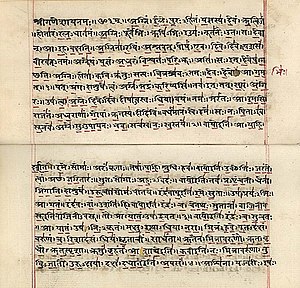梨俱吠陀

| 印度教系列模板 |
| 印度教 |
|---|
 |
《梨俱吠陀》(梵語:ऋग्वेद,羅馬化:ṛgveda),梵文由ṛc(「歌頌」)和veda(「知識」)兩個詞根構成,全名《梨俱吠陀本集》,漢譯為《歌詠明論[來源請求]》,是吠陀經中最早出現的一卷,成文於公元前16世紀到前11世紀,是除了赫梯語的文獻外,在印歐語系語言中最古老的書籍。與其他文明的古老文獻不同,它是以口傳方式保存下來的。
內容
[編輯]《梨俱吠陀》分十卷,收詩1,028首﹐其中有11首被認為是附錄,最短的詩只有3節,最長的詩有58節,是雅利安人來到印度河兩岸,對神的讚歌。
雅利安人將宇宙分為三界:天界、空界和地界,每一界有11個神,三界共33個神,天界的神有帝奧斯、婆樓那、蘇利耶、烏莎、羅底利;空界的神有因陀羅、阿邦那波陀、魯陀羅;地界之神有潑利提韋、阿耆尼、蘇摩,這些深厚而豐富的精神思維體系,反映出雅利安人對於先智慧開導者們的崇拜與嚮往。因陀羅是古印度人部落的首領,驍勇善戰,在公元前2000年征服印度,古印度人的詩人為了歌頌他而創作出200餘首神曲。
《梨俱吠陀》中所記載的妖魔,後人推斷為古代印度的奴隸,西來的雅利安人又以「瓦爾那」來分別其階級,最後再轉義為「種姓」,《梨俱吠陀》末卷出現了婆羅門、剎帝利、吠舍、首陀羅四個種姓。
《梨俱吠陀》除頌神的詩歌外,還有世俗詩歌,有一些以婚禮、愛情、巫術甚至是賭博為內容的神曲,例如第六章俗諦神曲序《賭徒懺悔錄》,描寫擲骰子的迷人之處,一位教徒賭輸後跪在神像前懺悔,哀號淒切,以及家中母親和妻子的憂傷。這些作品都反映着吠陀時期人民的生活習俗。
傳播
[編輯]《梨俱吠陀》的成書時間相傳是在公元前2000至前1500年之間,但最早的文字流傳僅能追溯至公元15世紀,《梨俱吠陀》實際上是靠婆羅門祭司們代代口耳相傳,爾後才有手稿。玄奘在迦濕彌羅的時候曾讀過「四吠陀」,但未必是此書,也不能證明唐朝時此書流傳於世。19世紀歐洲人第一次刊印《梨俱吠陀》,有德、英、法等譯本。
參見
[編輯]參考文獻
[編輯]- Editions
- editio princeps: Friedrich Max Müller, The Hymns of the Rigveda, with Sayana's commentary, London, 1849–75, 6 vols., 2nd ed. 4 vols., Oxford, 1890–92.
- Theodor Aufrecht, 2nd ed., Bonn, 1877.
- Sontakke, N. S. Rgveda-Samhitā: Śrimat-Sāyanāchārya virachita-bhāṣya-sametā. Sāyanachārya (commentary) First. Vaidika Samśodhana Maṇḍala. 1933.. The Editorial Board for the First Edition included N. S. Sontakke (Managing Editor), V. K. Rājvade, M. M. Vāsudevaśāstri, and T. S. Varadarājaśarmā.
- B. van Nooten und G. Holland, Rig Veda, a metrically restored text, Department of Sanskrit and Indian Studies, Harvard University, Harvard University Press, Cambridge, Massachusetts and London, England, 1994.
- Rgveda-Samhita, Text in Devanagari, English translation Notes and indices by H. H. Wilson, Ed. W.F. Webster, originally in 1888, Published Nag Publishers 1990, 11A/U.A. Jawaharnagar,Delhi-7.
- Commentary
- Sayana (14th century)
- ed. Müller 1849–75 (German translation);
- ed. Müller (original commentary of Sāyana in Sanskrit based on 24 manuscripts).
- ed. Sontakke et al., published by Vaidika Samsodhana Mandala, Pune (2nd ed. 1972) in 5 volumes.
- Rgveda-Samhitā Srimat-sāyanāchārya virachita-bhāṣya-sametā, ed. by Sontakke et al., published by Vaidika Samśodhana Mandala,Pune-9,1972, in 5 volumes (It is original commentary of Sāyana in Sanskrit based on over 60 manuscripts).
- Sri Aurobindo, Hymns to the Mystic Fire (Commentary on the Rig Veda), Lotus Press, Twin Lakes, Wisconsin ISBN 0-914955-22-5 [1] (頁面存檔備份,存於網際網路檔案館)
- Raimundo Pannikar (1972), The Vedic Experience, University of California Press
- Philology
- Vashishtha Narayan Jha, A Linguistic Analysis of the Rgveda-Padapatha Sri Satguru Publications, Delhi (1992).
- Bjorn Merker, Rig Veda Riddles In Nomad Perspective, Mongolian Studies, Journal of the Mongolian Society XI, 1988.
- Thomas Oberlies, Die Religion des Rgveda, Wien 1998.
- Oldenberg, Hermann. Hymnen des Rigveda. 1. Teil: Metrische und textgeschichtliche Prolegomena. Berlin 1888. (please add), Wiesbaden 1982. 1894.
- —Die Religion des Veda. Berlin 1894; Stuttgart 1917; Stuttgart 1927; Darmstadt 1977
- —Vedic Hymns, The Sacred Books of the East vo, l. 46 ed. Friedrich Max Müller, Oxford 1897
- Adolf Kaegi, The Rigveda: The Oldest Literature of the Indians (trans. R. Arrowsmith), Boston, Ginn and Co. (1886), 2004 reprint: ISBN 978-1-4179-8205-9.
- Mallory, J. P.; et al. Indo-Iranian Languages in Encyclopedia of Indo-European Culture. Fitzroy Dearborn. 19891997.
- Historical
- Anthony, David W., The Horse The Wheel And Language. How Bronze-Age Riders From the Eurasian Steppes Shaped The Modern World, Princeton University Press, 2007
- Avari, Burjor, India: The Ancient Past, London: Routledge, 2007, ISBN 978-0-415-35616-9
- Bryant, Edwin. The Quest for the Origins of Vedic Culture: The Indo-Aryan Migration Debate. Oxford: Oxford University Press. 2001. ISBN 0-19-513777-9.
- Flood, Gavin D., An Introduction to Hinduism, Cambridge University Press, 1996
- Lal, B.B. 2005. The Homeland of the Aryans. Evidence of Rigvedic Flora and Fauna & Archaeology, New Delhi, Aryan Books International.
- Talageri, Shrikant: The Rigveda: A Historical Analysis, 2000. ISBN 81-7742-010-0
- Witzel, Michael, Early Sanskritization: Origin and Development of the Kuru state (PDF), EJVS vol. 1 no. 4 (1995), 1995, (原始內容 (PDF)存檔於20 February 2012)
- Witzel, Michael (ed.), Inside the Texts, Beyond the Texts. New Approaches to the Study of the Vedas, Harvard Oriental Series, Opera Minora vol. 2, Cambridge: Harvard University Press, 1997
外部連結
[編輯]- Text
- Devanagari and transliteration (頁面存檔備份,存於網際網路檔案館) experimental online text at: sacred-texts.com
- ITRANS, Devanagari, transliteration (頁面存檔備份,存於網際網路檔案館) online text and PDF, several versions prepared by Detlef Eichler
- Transliteration, metrically restored (頁面存檔備份,存於網際網路檔案館) online text, at: Linguistics Research Center, Univ. of Texas
- Transliteration with tone accents (頁面存檔備份,存於網際網路檔案館) PDF prepared by Keith Briggs
- The Hymns of the Rigveda (頁面存檔備份,存於網際網路檔案館), Editio Princeps by Friedrich Max Müller (large PDF files of book scans). Two editions: London, 1877 (Samhita and Pada texts) and Oxford, 1890–92, with Sayana's commentary.
- 互聯網檔案館中梨俱吠陀的作品或與之相關的作品
- Audio
- Audio download (MP3) by Indian Institute of Scientific Heritage (IISH)
- Audio download (MP3) (頁面存檔備份,存於網際網路檔案館). Live recording by Varanasi-based scholars; chanted in North Indian style, i.e. without tones (yeha swara)
- Choral Hymns from the Rig Veda, Op.26, Gustav Holtz, 14 pieces in 4 groups, Piano with Violins, Romantic Movements, Vocal Scores (頁面存檔備份,存於網際網路檔案館), University of Rochester
- Translations
- English translation by Ralph T. H. Griffith on Wikisource
- For links to other translations, see Translations section above.
- Other
- Nomination of Rigveda Archive-It的存檔,存檔日期2007-09-26 (.doc format) submitted by India in 2006–2007 for inclusion in the Memory of the World Register.
- A Still Undeciphered Text: How the scientific approach to the Rigveda would open up Indo-European Studies, Karen Thomson (2009), The Journal of Indo-European Studies, Volume 37, Number 1 & 2, pages 1–47 (a review of various attempts to translate Rigveda and the issues with current translations)
- 季羨林:〈《梨俱吠陀》幾首哲學讚歌新解 (頁面存檔備份,存於網際網路檔案館)〉。

